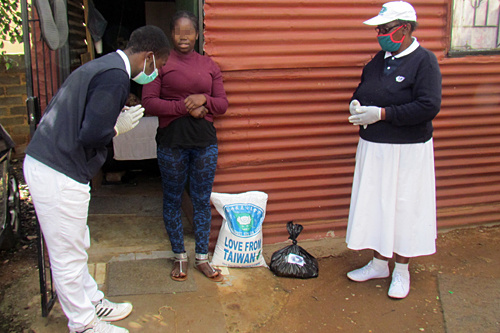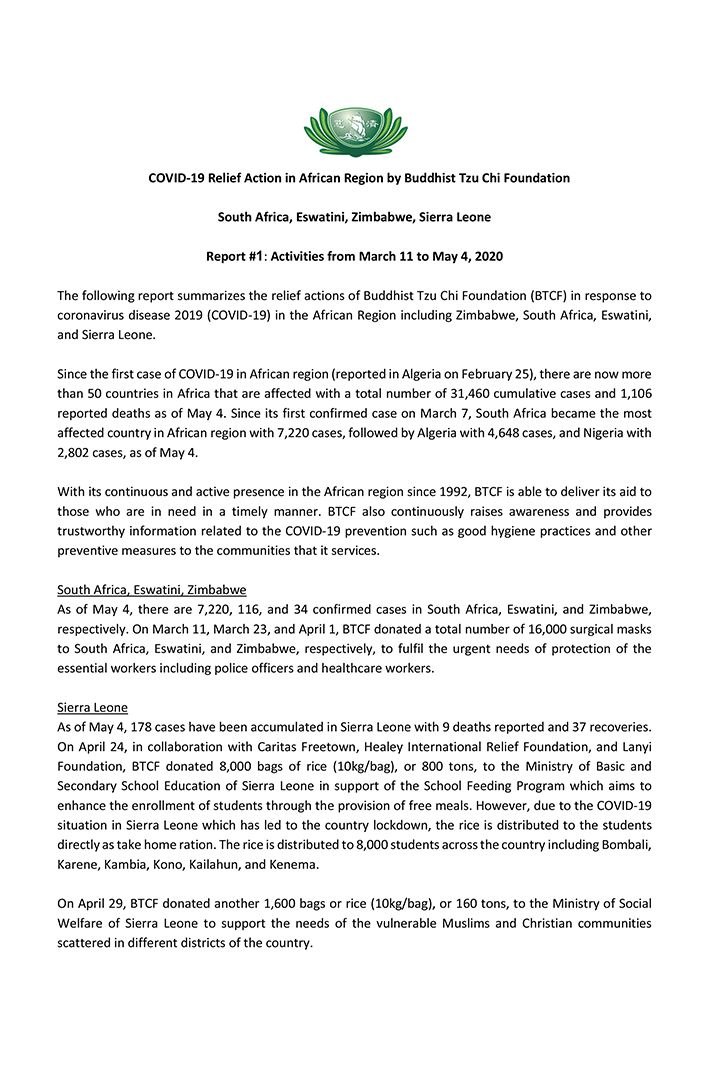The following report summarizes the relief actions of Buddhist Tzu Chi Foundation (BTCF) in response to coronavirus disease 2019 (COVID-19) in the African Region including Zimbabwe, South Africa, Eswatini, and Sierra Leone.

Since the first case of COVID-19 in African region (reported in Algeria on February 25), there are now more than 50 countries in Africa that are affected with a total number of 31,460 cumulative cases and 1,106 reported deaths as of May 4. Since its first confirmed case on March 7, South Africa became the most affected country in African region with 7,220 cases, followed by Algeria with 4,648 cases, and Nigeria with 2,802 cases, as of May 4.
With its continuous and active presence in the African region since 1992, BTCF is able to deliver its aid to those who are in need in a timely manner. BTCF also continuously raises awareness and provides trustworthy information related to the COVID-19 prevention such as good hygiene practices and other preventive measures to the communities that it services.
South Africa, Eswatini, Zimbabwe
As of May 4, there are 7,220, 116, and 34 confirmed cases in South Africa, Eswatini, and Zimbabwe, respectively. On March 11, March 23, and April 1, BTCF donated a total number of 16,000 surgical masks to South Africa, Eswatini, and Zimbabwe, respectively, to fulfil the urgent needs of protection of the essential workers including police officers and healthcare workers.
 Download pdf|2 Pages 117.83kb
Download pdf|2 Pages 117.83kbSierra Leone
As of May 4, 178 cases have been accumulated in Sierra Leone with 9 deaths reported and 37 recoveries. On April 24, in collaboration with Caritas Freetown, Healey International Relief Foundation, and Lanyi Foundation, BTCF donated 8,000 bags of rice (10kg/bag), or 800 tons, to the Ministry of Basic and Secondary School Education of Sierra Leone in support of the School Feeding Program which aims to enhance the enrollment of students through the provision of free meals. However, due to the COVID-19 situation in Sierra Leone which has led to the country lockdown, the rice is distributed to the students directly as take home ration. The rice is distributed to 8,000 students across the country including Bombali, Karene, Kambia, Kono, Kailahun, and Kenema.
On April 29, BTCF donated another 1,600 bags or rice (10kg/bag), or 160 tons, to the Ministry of Social Welfare of Sierra Leone to support the needs of the vulnerable Muslims and Christian communities scattered in different districts of the country.
On May 2, on behalf of BTCF, Healey International Relief Foundation, and Lanyi Foundation, Caritas Freetown delivered hospital beds, surgical masks, and gloves to the government of Sierra Leone to support the effort of combating the spread of the disease in the country. The items are allocated in the Emergency Operation Center (EOC) of Freetown, Sierra Leone, as part of the preparation for the influx of COVID-19 patients.
Recognizing the importance of food security and basic preventative measures by individuals and communities throughout this pandemic, BTCF will continue to examine, identify, and address the needs of the vulnerable and needy population across its countries of services in the region with the collaboration with local and international partners.
Working with a local Catholic church, a donation of Jing Si Multipurpose folding beds and eco-blankets were used to set-up a temporary dormitory for hospital staff who are not able to go home to their families due to the possibility of spreading COVID-19 to their communities.
Jing Si Multipurpose folding beds, along with the eco-blankets, had been created as an innovative disaster relief solution. It is made from recycled plastics, easy-to-transport and has a storage compartment to store belongings. The eco-blanket is made from PET bottles, has a small carbon footprint to produce and is lightweight. Working with our partners, BTCF was honored to provide a safe and healthy environment for medical personnels to rest.
COVID-19 has changed many aspects of daily living, from food price fluctuations, transport restrictions, healthcare issues to affected infrastructure. As COVID-19 continues to disrupt everyday life for much of the global population, organizations have to work with local governments, partners and make new connections to find the needs of all people. All mankind across faiths, cultures and nationalities must unite together to respond to the call of vulnerable communities.





